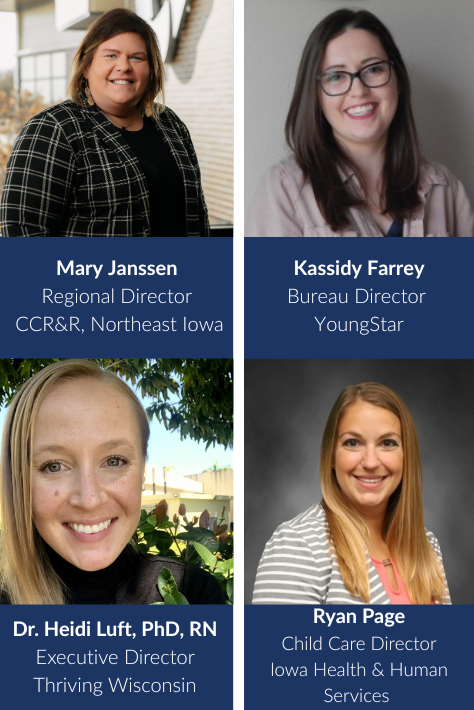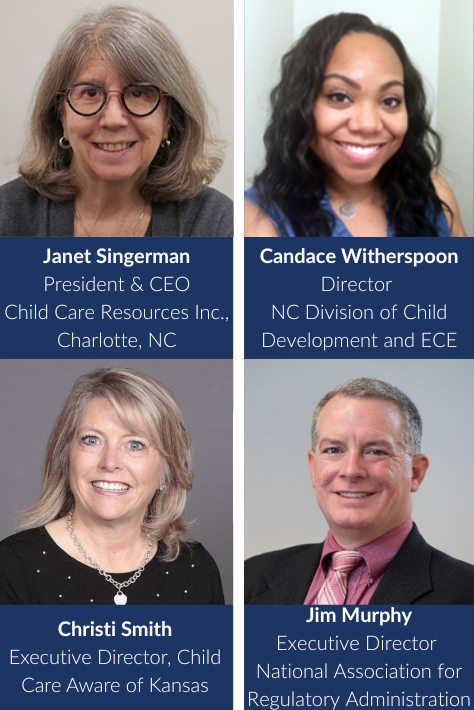Featured Speakers, Plenaries and Concurrent Sessions
Get inspired by the voices shaping the future of child care! Explore our featured speakers and sessions for the 2025 Symposium—thought leaders, advocates, and innovators coming together to spark change, share solutions, and elevate the field. Don’t miss these powerful conversations designed to inform, empower, and ignite action.

Shaping the Future – Leadership, Policy, and Social Impact
Opening Fireside Chat
Layla Zaidane is the President & CEO of Future Caucus – an organization working directly with our nation’s leading young policymakers on both a federal and state level to bridge the partisan divide and lead a new era of collaborative governance. Susan Gale Perry, CEO of Child Care Aware® of America will lead a fireside chat with Ms. Zaidane exploring the intersection of policy, leadership, and social impact. Expect a dynamic conversation filled with insights, actionable takeaways, and a vision for a more inclusive and forward-thinking society.

Strengthening Child Care: Bold Paths to Progress for Children and Families
Fireside Chat
Child Care Resource & Referral (CCR&R) organizations play a crucial role in fostering effective, efficient, and sustainable child care systems that strengthen communities by supporting children, families, and the economy. In this session, we will delve into how the new Position Statement from Child Care Aware of America (CCAoA) can enhance efforts to integrate the work of CCR&Rs into state systems. Learn how these efforts are essential for building the infrastructure necessary to improve child care access and quality, ultimately supporting the economic vitality of communities and ensuring long-term success for families and businesses alike. Join the conversation and explore how CCR&Rs can be a driving force in shaping more resilient, equitable child care systems.

The Backbone of the System: The Role of CCR&Rs as Critical Infrastructure
Featured Session
Child Care Resource & Referral (CCR&R) organizations are key to building strong, sustainable child care systems that support families, communities, and the economy. This session will explore how CCAoA’s new Position Statement can help integrate CCR&Rs into state systems, improve access and quality, and strengthen the infrastructure needed for long-term success. Join us to learn how CCR&Rs can drive more resilient and equitable child care solutions.

Navigating Regulatory Change: A Conversation
Plenary
Child care regulations play a pivotal role in ensuring the health, safety, and well-being of children in child care. In recent years, many states have embarked on significant reforms aimed at revising these regulations. This session will feature insights from CCR&R professionals and State Administrators in states that have been at the forefront of experiences with regulatory reform. Join us for a thoughtful discussion on the strategies that have proven successful in balancing the need for robust regulations with the flexibility required to support diverse child care settings. Learn about the challenges faced, the innovative solutions implemented, and how these efforts are shaping a more sustainable and equitable child care system.
Iowa's Innovation with Iowa Child Care Connect
Featured Session
Child care consumer education and referral are a crucial part of CCR&R core service provision, yet our technology tools and approach have not always kept up with how families and the public access information and data. Iowa embarked on an innovative and collaborative 4-year project to develop Iowa’s Child Care Connect (C3). C3 is not only an innovative solution for families seeking access to child care but does so in a way that uses multiple data sets to inform on near real-time access and availability of child care for Iowa’s families. These data sets include the use of Child Care Management Systems (CCMS’) as well as the Child Care Resource and Referral NDS 2.0. In this session you will hear about the work that it took to create C3, and to hear about the incredible impact it has had on the state’s child care system.
Investing in the Future: How Philanthropy is Championing Child Care in a Shifting Landscape
Featured Session
In a time of increasing pressure on federal social investments and shifting policy priorities, many health and human service and advocacy organizations are turning to philanthropy to help sustain momentum and drive progress. Explore how philanthropic leaders are establishing priorities in today's complex social and political climate and learn practical strategies for cultivating strong, reciprocal relationships with the philanthropic community—as partners, champions, and investors in change.
Economics and Child Care—Where are we and where do we go from here?
Featured Session
Twenty of the nation’s leading experts on economics and child care gathered in Omaha, Nebraska, in October 2024, to discuss the state of child care in the United States and make recommendations on how to use what we have learned to improve. The conversation was framed around five unanswered questions that are barriers to moving forward in building a comprehensive system that truly meets the needs of those who depend on it: families, businesses, providers, and, most of all, the children who receive care. During this session, panelists will delve into the insights from this Roundtable conversation and attendees will learn more about forthcoming work from the participants.
*Titles and Descriptions are subject to change
Concurrent Sessions
Explore our concurrent sessions that deep dive into topics like innovative programs and practices, elevating the child care system, cutting edge research, standing for child care, and much more.
Sunday, May 4, Concurrent Sessions
-
Building Bridges: Integrating Child Care into Community and Economic Development
-
Building a Solid Foundation: A Comprehensive Approach to Supporting Family Child Care
-
Strategic Public Financing Solutions for Child Care Sustainability
-
From Groundwork to Framework: How Community-Driven Solutions and State Partnerships Are Transforming Child Care in Kansas
-
Strengthening CCR&R Support for Family Child Care Educators Through Policy and Practice
-
Professional Development Pathway Restructure: Idaho's Journey
-
Future-Proofing ECE: Emerging Technology for Quality & Growth
-
Early Childhood Data and Governance: Understanding State’s Approaches to Early Childhood Education
-
Update to the National Database of Child Care Prices
Monday, May 5, Concurrent Sessions
-
What does child care look like under the Trump Administration
-
Leveraging NAEYC resources to support state quality initiatives
-
Policy Research to Policy Impact: Findings and Lessons from Nebraska’s Subsidy Income Expansion Impact Study
-
A Systems Approach to Dismantling Barriers: The Case of Farsi-speaking Women Entering the Child Care Workforce
-
Advancing Early Childhood Education with Local Investments
-
Care & Immigration: What Care Advocates Need to Know about Centering and Supporting Immigrant Children, Families, And Early Educators
-
Empowering Louisiana Communities: A Strategic Approach to Local Funding for Early Care and Education
-
AI for Good: Using Data-Driven Insights to Transform Child Care Program Quality
-
Empowering Family, Friend, and Neighbor Caregivers through Infant and Early Childhood Mental Health Consultation
-
Deep Collaboration + Intentional Infrastructure= Positive Impact for Children and Families
-
Supporting Quality in Child Care: Reviewing and Refining Resources that Define and Strengthen Technical Assistance and Professional Development Services in Child Care
-
Things to consider when implementing, updating, or scaling a coaching program
-
Child Care Facilities: Uncovering COVID era investments and progress in states, localities and Tribal communities
-
Implementing Public-Private Partnerships for Child Care
-
Empowering Tribal Nations: Building Child Care Systems Rooted in Sovereignty and Culture
-
Maximizing Impact: Strengthening Early Childhood Programs Through CCMS-Aligned Business Coaching
Wednesday, May 7, Concurrent Sessions
-
The State of the ECE field in 2025: Discussing Findings from NAEYC’s ECE Workforce Surveys
-
Creating Long-lasting Impact: A Framework for ECE Workforce Systems Change
-
Establishing and Implementing Target Compensation for the Child Care Workforce: A Step-by-Step Approach
-
Strengthening the Sustainability of Small Child Care Providers
-
Envisioning Change – What Works/What’s Needed for Closing the Racial Gap for Black ECE
-
More than a number: Cost studies and modeling in early education
-
The Business Navigator-An Employer's Guide to Child Card Solutions in New York State
-
Addressing Child Care Shortages Through Insights from Child Care Providers
-
State ECE Policy: Problems, Progress, Possibilities
-
Opening the Door to Quality Resource Review
-
Approaches to Job-Embedded PD/TA Initiatives: Enhancing Educator Effectiveness and Improving Child Outcomes
-
Professional Development Pathway Restructure: Idaho's Journey
-
Sustaining Our Educators: A Holistic View of Workforce Well-being
-
Monitoring Vermont’s Historic Early Childhood Investments and Using Data to Inform Policy and Practice
-
California’s Blueprint to Success: Implementing an Innovative Statewide Infant and Early Childhood Mental Health Consultant Training Program
-
The Business Navigator—An Employer’s Guide to Child Care Solutions in New York State
-
Seizing the Moment: Advocacy Strategies and Easy to Use Tools that Work
-
How child care cost modeling can advance the goal of a quality affordable, and accessible child care system.
-
Re-imagining Early Care and Education: Quality Supports using a Community Engagement Strategy
-
Innovative Approaches to Job-Embedded PD/TA Initiatives: Enhancing Educator Effectiveness and Improving Child Outcomes
-
Healthy Child Care, Stronger Communities: Turning Partnerships into Progress
*Titles and Descriptions are subject to change